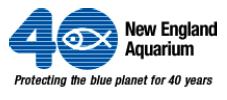tags: HR669, pets, exotic animals, invasive species, ornamental fish trade, aquaculture, New England Aquarium, politics
This morning, I was contacted by Scott Dowd, a biologist who specializes in studying fishes in the Amazon with the New England Aquarium. Scott sent this letter, written yesterday by Bud Ris, the President and CEO of the New England Aquarium, regarding their official position on HR 669. Scott gave permission for me to share the text of the letter here, which appears below the fold, and I also have permission to share the PDF of the letter with interested others.
April 17, 2009
Dear Subcommittee Members,
We have reviewed HR 669, The Nonative [sic] Wildlife Invasion Prevention Act. While we applaud the intention of the resolution, we are concerned that there will be substantial unintended consequences from the bill, as written, that would be devastating to the $278 million/year aquarium fish trade and to aquatic life, both cultured and wild harvested. These negative consequences include both adverse effects on rural poor and on ecosystems of critical biological importance.
For more than 20 years, the New England Aquarium has been involved in research on the global trade of aquarium fishes. We have noted numerous situations where the fishery harvest has a negligible impact on the long term stability of commercialized species, but is very important to the local economy. Many of these fisheries play a critical role in rural communities and are a sustainable resource that provides much needed livelihoods. Because of their reliance on these fisheries, and the dependence of the fishes on healthy habitat, the people of these regions play an important role in managing their environment in a responsible manner. Many local communities know that in order to maintain their economies and way of life, they must protect the ecosystems within which targeted species thrive.
These ecosystems include reef ecosystems, riverine ecosystems, and vast tracts of flooded Amazon rainforest. The latter are of critical ecological importance not only locally and nationally, but globally in terms of their biological diversity and their role as carbon sinks. Protecting sustainably harvested fisheries can, therefore, provide significant environmental benefits.
In general, the ornamental fish trade is one that provides substantial jobs and income, not just to rural communities in Latin America that have few other options, but also to many people in the US and Europe. Globally, the ornamental fish trade is a multi billion dollar industry. HR 669 as it is currently drafted could result in the loss of substantial revenue for small businesses throughout the country during the already serious economic downturn.
Many of the community-based fisheries already face a variety of threats and challenges. At the New England Aquarium, we have been developing a strategy that will help these fisheries move toward full sustainability, reduce or eliminate ecosystem threats, and take advantage of opportunities to maximize benefits. Central to this strategy is the development of internationally recognized certification system of Best Handling Practices, with routine disease screening, and biosecurity measures. Species that represent a threat of dangerous introduction to the US will not be included.
We urge the subcommittee to amend HR 669 to protect critical ornamental fisheries and prevent adverse effects on the regions and the people that depend on them.
There are effective means, other than HR 669, to reduce the introduction of exotics. An excellent model, the Responsible Fishkeeping Initiative, exists in the Northeast region. The Initiative is working in partnership with retail pet shops who, on a voluntary basis, are taking a pledge to discontinue the sale of fishes inappropriate for home aquariums. Also, to provide an alternative to releasing problem fish into local waters, participating retailers have agreed to take in unwanted pet fish and either euthanize them or secure new homes for them.
We are willing to assist the subcommittee with technical input in the areas of ornamental fisheries and invasive species to create a resolution that will better protect marine and freshwater ecosystems, support local communities that harvest fish sustainably, encourage responsible fishkeeping in the U.S., and protect the small businesses that depend upon this trade.
Sincerely,
Bud Ris
President & CEO
HR 669 Links:
Will HR 669 Transform Your Exotic Animals into Illegal Aliens?
My detailed analysis of HR 669 and its impacts.
Video discussing some of the impacts HR 669 will have on exotic animal breeders, pet store owners and scientists.
Brief Factsheet (printable) regarding HR 669 and its impacts.

